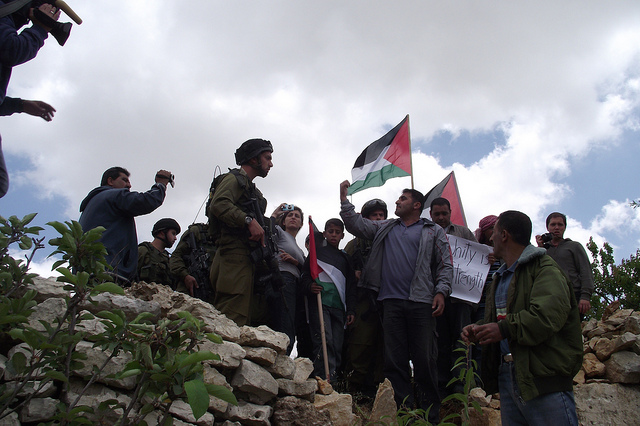BY Neal Ungerleider

Anti-Israel demonstrations and riots have broken out across the Middle East, leading up to the May 14 anniversary of the creation of Israel. Massive demonstrations calling for the annulment of Egypt and Jordan's peace treaties with Israel took place in Amman and Cairo, while riots have already struck Jerusalem, the West Bank and the Gaza Strip at press time. A Facebook page calling for a third Palestinian intifada, or revolt against Israel, to take place on May 15, has gone viral. Several Palestinian politicians already granted tentative support to the idea of a new intifada. Will the next great Middle Eastern revolt, yet again, be driven by social media?
This past March, an Arabic-language Facebook page titled “Third Palestinian Intifada” began amassing hundreds of thousands of followers. The page called for a mass march by Palestinian refugees from the 1948 and 1967 wars and their descendants on the borders of Israel, Gaza, and the West Bank on May 15, with unspecified actions to take place afterwards. May 15 is Nakba Day, an annual day of commemoration for Palestinians who lost their homes in the ethnic warfare that followed the British withdrawal from Palestine. While the page's (anonymous) moderators initially deleted posts urging violence and bloodshed, the flood of posting to the page's wall eventually began to include a large number of messages and videos urging for the killing of both Israelis and Jews in general.
The march appears to be beginning to take place at press time--Egyptian authorities have started stockpiling emergency supplies in Sinai in preparation for a “Million Man March” that is expected to take place on May 15 from Cairo on the Egypt-Gaza border.

[Image: Pro-Palestinian Protest in Takhrir Square, Cairo on May 13 via Twitter user @hany2m]
On March 29, when the “Third Palestinian Intifada” page reached 340,000 followers, Facebook took the page offline following calls from the Anti-Defamation League (ADL) and a letter to Mark Zuckerberg from Israeli Public Diplomacy and Diaspora Affairs Minister Yuli Edelstein. In the letter, Edelstein claimed “there are posted many remarks and movie clips which call for the killing of Israelis and Jews and the 'liberating' of Jerusalem and of Palestine through acts of violence.” Fast Company also reported on a $1 billion lawsuit filed against Zuckerberg by Larry Klayman, a Jewish-American lawyer who argued that his life was put at risk by Facebook not taking down the page quickly enough.
According to Abraham Foxman, National Director of the ADL, his organization “called on Facebook to remove the page calling for a Third Intifada out of a very real concern that this was a call to violent action against Israel and Jews. The Third Intifada Facebook page on Facebook explicitly called for followers to build on the previous Intifada. The Second Palestinian Intifada, from 2000 through 2008, was responsible for thousands of casualties and deaths through a campaign of terrorism against Israel that included suicide bombings of restaurants, buses, dance clubs and cafes.”
However, pro-Palestinian activists quickly began putting mirrors of the page online on Facebook and elsewhere. The largest of these is the pan-Muslim Rassoul Allah page on Facebook, which has a staggering 3.5 million followers. The latest Arabic-language poll posted to the site as of press time asks participants if they are “ready for martyrdom for the liberation of Palestine and the al-Aqsa Mosque.” Another prominent mirrior, 3rdintifada.com, also started social media presences on Twitter and YouTube.

As much as pundits such as Malcolm Gladwell argue that social media does not spur revolutionary movements in the Middle East or elsewhere, facts on the ground indicate otherwise. Journalist David Wolman wrote extensively for The Atavist on how social media spurred the Egyptian revolution and the widespread use of Facebook, Twitter, and YouTube across the Middle East has been extensively documented. Social media allows the individual revolutionary to efficiently smuggle out essential information, gain safety in numbers, to propagandize their cause, and gain access to a worldwide circle of sympathy--this is something that television and landline telephones simply cannot do. For activists, social media has been the most important technological innovation since the printing press for disseminating ideas.
But while the page was taken down, it acquired a new life both on- and offline. High-ranking officials in Fatah, the ruling faction of the West Bank, have implied some level of support for the “Facebook Intifada.”
In an interview with Israeli Army Radio, Fatah Central Committee member Ahmad Zaki claimed that the Palestinian Authority “could not silence the Palestinian street after it saw the achievements of other people” when asked directly if a new intifada could begin on May 15. Abu Ammar, Fatah's head in the Gaza Strip, also told Palestinian newspaper al-Hayat al-Jadida that unspecified “joint central activities” were being planned between Hamas and Fatah that included “all national and Islamic forces.” However, other prominent Fatah officials have gone on record as being opposed to the May 15 plans.
The participants in eager conversations on Facebook, Twitter, and YouTube tend to be young diaspora Palestinians and fellow Arabs or Muslims who have adopted the Palestinian cause as their own. Large numbers of Egyptians, moved by the suffering of civilians in Gaza and enmity toward their Israeli arch enemies, are gearing up to march on the border. However, journalists currently working on the ground in the West Bank and Gaza argue that residents there are skeptical of a new intifada.
All said though, the Middle East is one of the most war- and strife-blessed regions this side of the Balkans. The tinderbox of the Israeli-Palestinian conflict could catch fire at any time; gossip of a third intifada this weekend and an Israeli decision to crush any potential upcoming protests .If the massive changes in Egypt, Tunisia, Bahrain, Syria, Libya, and elsewhere have taught us anything this year, it is that the conventional wisdom cannot predict a single thing.
3rd intafada demonstartions Cairo Third Intifada demonstrations - Noor Mosque in Cairo (5-13-2011) What they are saying is "Khaibar, Khaibar, O Jews.
The Army of Muhammad will return
Khaibar, Khaibar, O Jews.
The Army of Muhammad will return
Khaibar, Khaibar, O Jews.
The Army of Muhammad will return
Khaibar, Khaibar, O Jews.
The Army of Muhammad will return
Hey hey hey, hey hey hey.
Khaibar, Khaibar, O Jews.
The Army of Muhammad will return
Khaibar, Khaibar, O Jews.
The Army of Muhammad will return
Khaibar, Khaibar, O Jews.
The Army of Muhammad will return
Khaibar, Khaibar, O Jews.
The Army of Muhammad will return
We will crawl and fight.
With our blood, we will fight.
We will crawl and fight.
With our blood we will fight.
Anti-Israel Demonstrations by Egytians
After a page calling for a mass march by Palestinians on the borders of Israel on May 15 was taken offline by Facebook, mirror sites with more than 3.5 million followers sprung up. Now Egyptians are preparing to march on Gaza and the Israeli military is threatening to crush protests. Will the so-called "Facebook Intifada" tip the Middle East into further turmoil?

Anti-Israel demonstrations and riots have broken out across the Middle East, leading up to the May 14 anniversary of the creation of Israel. Massive demonstrations calling for the annulment of Egypt and Jordan's peace treaties with Israel took place in Amman and Cairo, while riots have already struck Jerusalem, the West Bank and the Gaza Strip at press time. A Facebook page calling for a third Palestinian intifada, or revolt against Israel, to take place on May 15, has gone viral. Several Palestinian politicians already granted tentative support to the idea of a new intifada. Will the next great Middle Eastern revolt, yet again, be driven by social media?
This past March, an Arabic-language Facebook page titled “Third Palestinian Intifada” began amassing hundreds of thousands of followers. The page called for a mass march by Palestinian refugees from the 1948 and 1967 wars and their descendants on the borders of Israel, Gaza, and the West Bank on May 15, with unspecified actions to take place afterwards. May 15 is Nakba Day, an annual day of commemoration for Palestinians who lost their homes in the ethnic warfare that followed the British withdrawal from Palestine. While the page's (anonymous) moderators initially deleted posts urging violence and bloodshed, the flood of posting to the page's wall eventually began to include a large number of messages and videos urging for the killing of both Israelis and Jews in general.
The march appears to be beginning to take place at press time--Egyptian authorities have started stockpiling emergency supplies in Sinai in preparation for a “Million Man March” that is expected to take place on May 15 from Cairo on the Egypt-Gaza border.

[Image: Pro-Palestinian Protest in Takhrir Square, Cairo on May 13 via Twitter user @hany2m]
On March 29, when the “Third Palestinian Intifada” page reached 340,000 followers, Facebook took the page offline following calls from the Anti-Defamation League (ADL) and a letter to Mark Zuckerberg from Israeli Public Diplomacy and Diaspora Affairs Minister Yuli Edelstein. In the letter, Edelstein claimed “there are posted many remarks and movie clips which call for the killing of Israelis and Jews and the 'liberating' of Jerusalem and of Palestine through acts of violence.” Fast Company also reported on a $1 billion lawsuit filed against Zuckerberg by Larry Klayman, a Jewish-American lawyer who argued that his life was put at risk by Facebook not taking down the page quickly enough.
According to Abraham Foxman, National Director of the ADL, his organization “called on Facebook to remove the page calling for a Third Intifada out of a very real concern that this was a call to violent action against Israel and Jews. The Third Intifada Facebook page on Facebook explicitly called for followers to build on the previous Intifada. The Second Palestinian Intifada, from 2000 through 2008, was responsible for thousands of casualties and deaths through a campaign of terrorism against Israel that included suicide bombings of restaurants, buses, dance clubs and cafes.”
However, pro-Palestinian activists quickly began putting mirrors of the page online on Facebook and elsewhere. The largest of these is the pan-Muslim Rassoul Allah page on Facebook, which has a staggering 3.5 million followers. The latest Arabic-language poll posted to the site as of press time asks participants if they are “ready for martyrdom for the liberation of Palestine and the al-Aqsa Mosque.” Another prominent mirrior, 3rdintifada.com, also started social media presences on Twitter and YouTube.

As much as pundits such as Malcolm Gladwell argue that social media does not spur revolutionary movements in the Middle East or elsewhere, facts on the ground indicate otherwise. Journalist David Wolman wrote extensively for The Atavist on how social media spurred the Egyptian revolution and the widespread use of Facebook, Twitter, and YouTube across the Middle East has been extensively documented. Social media allows the individual revolutionary to efficiently smuggle out essential information, gain safety in numbers, to propagandize their cause, and gain access to a worldwide circle of sympathy--this is something that television and landline telephones simply cannot do. For activists, social media has been the most important technological innovation since the printing press for disseminating ideas.
But while the page was taken down, it acquired a new life both on- and offline. High-ranking officials in Fatah, the ruling faction of the West Bank, have implied some level of support for the “Facebook Intifada.”
In an interview with Israeli Army Radio, Fatah Central Committee member Ahmad Zaki claimed that the Palestinian Authority “could not silence the Palestinian street after it saw the achievements of other people” when asked directly if a new intifada could begin on May 15. Abu Ammar, Fatah's head in the Gaza Strip, also told Palestinian newspaper al-Hayat al-Jadida that unspecified “joint central activities” were being planned between Hamas and Fatah that included “all national and Islamic forces.” However, other prominent Fatah officials have gone on record as being opposed to the May 15 plans.
Meanwhile, Hamas has stayed suspiciously mum on the issue of the “Facebook Intifada” even through a mass march on Gaza from Egypt appears to be under way. However, Hamas' Iranian financial backers have enthusiastically supported the idea of resuming hostilities against Israel on May 15. Iranian-funded television news network Press TV has formally announced May 15 as the beginning of a new intifada and Iranian Intelligence Minister Heidar Moslehi has previously announced his country's plans to support a social media-generated intifada against Israel as far back as 2010. Moslehi was one of the key figures in the brutal persecution of Iranian demonstrators following the contested 2009 election.
But despite Iranian enthusiasm for the plan, all the evidence points to talk of a Third Intifada on social media being a genuinely grassroots project not controlled by either Fatah, Hamas, or foreign backers.The participants in eager conversations on Facebook, Twitter, and YouTube tend to be young diaspora Palestinians and fellow Arabs or Muslims who have adopted the Palestinian cause as their own. Large numbers of Egyptians, moved by the suffering of civilians in Gaza and enmity toward their Israeli arch enemies, are gearing up to march on the border. However, journalists currently working on the ground in the West Bank and Gaza argue that residents there are skeptical of a new intifada.
All said though, the Middle East is one of the most war- and strife-blessed regions this side of the Balkans. The tinderbox of the Israeli-Palestinian conflict could catch fire at any time; gossip of a third intifada this weekend and an Israeli decision to crush any potential upcoming protests .If the massive changes in Egypt, Tunisia, Bahrain, Syria, Libya, and elsewhere have taught us anything this year, it is that the conventional wisdom cannot predict a single thing.
3rd intafada demonstartions Cairo Third Intifada demonstrations - Noor Mosque in Cairo (5-13-2011) What they are saying is "Khaibar, Khaibar, O Jews.
The Army of Muhammad will return
Khaibar, Khaibar, O Jews.
The Army of Muhammad will return
Khaibar, Khaibar, O Jews.
The Army of Muhammad will return
Khaibar, Khaibar, O Jews.
The Army of Muhammad will return
Hey hey hey, hey hey hey.
Khaibar, Khaibar, O Jews.
The Army of Muhammad will return
Khaibar, Khaibar, O Jews.
The Army of Muhammad will return
Khaibar, Khaibar, O Jews.
The Army of Muhammad will return
Khaibar, Khaibar, O Jews.
The Army of Muhammad will return
We will crawl and fight.
With our blood, we will fight.
We will crawl and fight.
With our blood we will fight.
Anti-Israel Demonstrations by Egytians
No comments:
Post a Comment